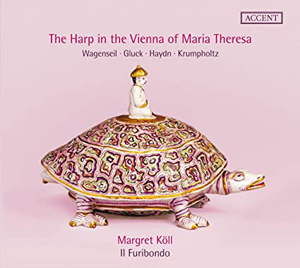Mention the word “harp” and most people likely would picture the concert instrument most often seen on symphony orchestra stages. Large and powerful, and, due to its array of pedals and ingenious construction, capable of playing in any key, the “double-action” harp (each pedal able to raise the pitch of a given set of strings by both a semi-tone and a whole tone, rather than one semi-tone in the single-action instrument) is the modern standard, although its mechanism was patented in the early 1800s. In addition to mastering the demanding finger technique, a harpist must manage the challenge of operating seven pedals, each with three different positions, adjusting for any key changes or chromatic alterations throughout a given piece. My appreciation for all of this came when, as a young composition student, my teacher assigned me–who had never come closer than a symphony audience seat to a real harp–to write a solo piece for the instrument, to be played by one of the school’s accomplished harp majors. God bless harpists!
The instrument we’re dealing with here is the single-action version, originally designed by Jacob Hochbrucker, which became the standard in Europe sometime in the 1720s. Somewhat less versatile than the later double-action instrument, it was nevertheless capable of negotiating the more complex music of the day, including works by Haydn, Wagenseil, and Krumpholtz. Viennese musician Georg Wagenseil is yet another composer who would be much better known today had he not lived in the shadow of an eminently more dominant figure, in this case Haydn. The two works included here, one a concerto with harp, violins, and cello, the other a sonata for strings, show the craft and inventiveness of a first-rate composer, with a thorough grasp of style, thematic development, and structural proportion.
Johann Krumpholtz was a harpist in Haydn’s Eisenstadt orchestra as well as a composer, and his sonata is a testament to his virtuosity and to his admirable ability to show off his instrument in a refined, formal context. Gluck’s operas offered numerous occasions to feature a harp, and here we have a solo rendition of Orfeo’s famous aria Che farò senza Euridice. Happily, the programmers of this disc chose to vary the program with a few non-harp pieces–a couple of trios by Haydn and Wagenseil, and a couple of dances from Gluck’s Orfeo.
Margret Köll is a terrific advocate for her instrument and for the works and composers represented here. As you listen you’re not particularly aware that this is “harp” music; rather, it’s just very fine baroque/classical chamber music that happens to include a harp, which, due to its string-family cred and to the skill of the composers, melds with and complements the voices of the violins, viola, and cello. All things considered, this is simply a first-rate chamber music disc; it’s also one of those rare recordings that can occupy either the foreground or background, repeatable without ever wearing out its welcome. Strongly recommended.
































